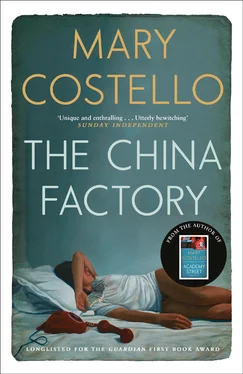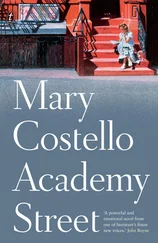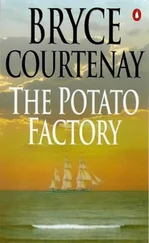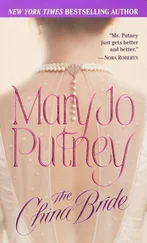Mary Costello - The China Factory
Здесь есть возможность читать онлайн «Mary Costello - The China Factory» весь текст электронной книги совершенно бесплатно (целиком полную версию без сокращений). В некоторых случаях можно слушать аудио, скачать через торрент в формате fb2 и присутствует краткое содержание. Год выпуска: 2015, Издательство: Canongate Books, Жанр: Современная проза, на английском языке. Описание произведения, (предисловие) а так же отзывы посетителей доступны на портале библиотеки ЛибКат.
- Название:The China Factory
- Автор:
- Издательство:Canongate Books
- Жанр:
- Год:2015
- ISBN:нет данных
- Рейтинг книги:5 / 5. Голосов: 1
-
Избранное:Добавить в избранное
- Отзывы:
-
Ваша оценка:
- 100
- 1
- 2
- 3
- 4
- 5
The China Factory: краткое содержание, описание и аннотация
Предлагаем к чтению аннотацию, описание, краткое содержание или предисловие (зависит от того, что написал сам автор книги «The China Factory»). Если вы не нашли необходимую информацию о книге — напишите в комментариях, мы постараемся отыскать её.
In these twelve haunting stories award-winning writer Mary Costello examines the passions and perils of everyday life with startling insight, casting a light into the darkest corners of the human heart.
The China Factory — читать онлайн бесплатно полную книгу (весь текст) целиком
Ниже представлен текст книги, разбитый по страницам. Система сохранения места последней прочитанной страницы, позволяет с удобством читать онлайн бесплатно книгу «The China Factory», без необходимости каждый раз заново искать на чём Вы остановились. Поставьте закладку, и сможете в любой момент перейти на страницу, на которой закончили чтение.
Интервал:
Закладка:
Emily’s asthma had become chronic over the winter. Every night her wheeze filled the house and Ruth or David ran up and down the stairs all evening. And yet she slept through the night, this pale compliant child. Charlie had been different — a riotous boy, scarcely sleeping, hyper alert to every sound in the house. She had removed the ticking clock from his room before he was a year old. One Sunday when he was eighteen months, they drove to a restaurant in the foothills of the Dublin Mountains. Charlie followed everything that moved. He spat his dinner down the front of his red jumper and stepped into the path of waiters and around tables, seeking out the children of other diners. Silently, repeatedly, Ruth or Matt went to retrieve him. When they finished Matt paid the bill and Ruth tried to coax Charlie into his buggy. Then her phone rang. It was her sister Angie in London.
From the porch of the restaurant she watched them cross the car park. Matt was holding Charlie with one hand and wheeling the buggy with the other. Every now and then a car whizzed by on the road outside. Matt bent down to fix Charlie’s shoe and she saw the pale curls on the back of the child’s head rise in the wind. She stepped outside and began the walk to the car. Something was different, something was halted or hovering in the air. On the phone Angie told her she needed to live a little. Matt let Charlie’s hand go for a second while he collapsed the buggy and opened the boot. The wind gusted and a strand of hair hit her face and she turned back to catch something Angie was saying. When she turned around Matt was running through the entrance. There was a screech of brakes. She squinted at the red bundle that rose into the air. She watched the falling, so much swifter than the rising, and she was struck by the absurd grace of the movement. She thought that from where Matt was standing, he could have reached out and broken the fall.
Paul called several times during the week with updates on the repatriation of Matt’s remains. ‘The embassy people are working on it. It’s just a matter of waiting now,’ he said.
‘What happened? Was it a steep fall?’
‘No. Just three rises. They had only started out. He lost his foothold — he wasn’t roped up.’
She had pictured a great fall, from thousands of feet. From a dazzling white snow field. He had been in thrall to all that, to the colossal silence, to the mysteries of the mountains and their beckoning.
‘It was quick,’ Paul said. ‘He wouldn’t have suffered. Maurice had the post-mortem report translated from Arabic today…’ He paused. ‘Internal injuries… Do you want to hear this, Ruth?’
His legs had not broken — the long muscular legs he’d thrown across her belly, pinning her down in his sleep, had held firm.
‘Are you going out there?’ she asked.
‘No. Anna thought I should, but Maurice is going to accompany him home. I’ll be at the airport and drive west with the hearse.’
At the mention of the hearse she pressed the phone hard against her ear. She had thought he would always exist, and be easily found again. She had not envisaged this. She had not imagined him tumbling from those ancient rocks. She had not foreseen him falling from the sky.
‘Ruth,’ Paul said, ‘I know you have your own life now but—’ ‘I’ll come to the funeral,’ she said. Then, ‘Is there anyone… A woman, I mean?’
‘No. Not that we know of.’
She thought of something. ‘Could he have had a heart attack?’
‘No. The heart was perfect.’
It was Paul who had driven them to the cemetery that April morning. She and Matt sat in the back with the white coffin on their laps. A small group of mourners was leaving the cemetery and at the sight of the white coffin a woman clasped the arm of another. Ruth kept looking back at them. Then the priest started up the prayers. She heard a tinkle on the wind and she turned her head and there, in row after row, were hundreds of identical graves, each adorned with wind chimes and toys and trinkets, and for a second her heart rose and she turned to tell Matt. But he was leaning into the grave, unsteady with the weight of the coffin in his hands, and her sister was reading a poem in a voice starting to crack. Ruth saw her mother’s shoes sinking into the clay and then her brother’s startled eyes. The traffic roared just beyond the high wall. Suddenly she was afraid the graves might part, cleave open like the Red Sea and spill out their contents onto the busy road. She closed her eyes for a second and when she opened them her father was leaning against a tree.
The next day they drove back across the city to the cemetery. Matt put his hands in his pockets and circled the grave and looked up at the sky. She tossed little pools of rainwater from the flower wrappings. As they walked away she put her arm through his. The next day he would not go back with her. She pleaded with him. She began to visit alone. She could scarcely conceive of Charlie down there, and when she did she grew afraid. She forced her mind onto other things — the clouds racing across the sky above her, the smooth round stones on the beach near her childhood home, her parents eating breakfast at their kitchen table that morning.
One evening, a few weeks later, Matt came into the kitchen. Her mother and sister had just left and she was standing at the sink washing mugs.
‘I’m sorry,’ he said.
She turned and looked at him. ‘I just want us to go over there together sometimes. Is that too much to ask?’
‘No. I mean, I’m sorry it happened. I’m sorry I let go of his hand.’
She turned back to the sink. ‘It wasn’t your fault.’
A huge bubble formed on the shoulder of her thumb. The face reflected in it was large and distorted. Before it bursts, she thought, he will have left the kitchen.
‘It was both our faults,’ she said then. ‘We never should have had him. I always knew something like this would happen.’
Slowly, with time, people told her, they would recover. Yes, she thought. Matt would come in some evening and she would look up from her book and he would tell her a story from work, and for a few minutes they would return to what they had once been, before he existed. They would not say much at first but by degrees they would start to mention his name. They would survive.
‘They should have gone out there to bring him home,’ David said. ‘If he were my brother, I’d have gone.’ He sat on the couch beside her and switched TV channels. She had lain awake the night before, thinking: We have abandoned you, Matt, we have left you locked in a cold drawer in a foreign land .
‘What time is the flight due?’ David asked.
‘It’s the last Aer Lingus one from Heathrow.’
He brought the Teletext page up on the TV screen and they scanned in silence.
‘Due 10pm and it’s running forty minutes late already,’ he said. ‘Jesus, it’ll be all hours when they get to Mayo.’ He looked at her. ‘We can drop Emily off at my mother’s on our way.’
She frowned and shook her head. ‘You don’t need to come.’
She did not want any part of this new life, this second life, touching the first. ‘Please, I’m asking you,’ she said.
‘Why do you have to go at all? What good will it do?’
He turned away, hurt. The nine o’clock news ended. The weather came on. The next day would be dry and sunny, with heavy rain moving eastwards in the evening. She looked at the map of Ireland on the screen. The damp Mayo soil was already piled up beside the open grave.
‘I’ll make us tea,’ David said.
They sat on the couch with tea and biscuits. David tracked the flight obsessively. Finally, at 11.48pm, it landed.
‘Go to bed now,’ he said softly.
The year after Charlie’s death they had rented a cottage on an island off Mayo. It was March and they slept late and woke to the sound of the sea and the white light in the bedroom. By day they walked around the island, over sand dunes, in and out of little inlets and across tiny pristine beaches, as if they were the first humans to set foot on those sands. On the mainland they climbed Croagh Patrick and the clouds parted and he pointed out their island in Clew Bay. That evening a fisherman took their photograph on the pier. Matt had his arm around her shoulder and her hair was blown back by the wind. Minutes later he stripped off his clothes and swam out with the tide. Her eyes never left him. She remembered a hike he’d taken her on, years before, on the Wicklow Mountains. They had walked all day and he had held her hand crossing streams. When they got to the highest peak he stood behind her with his breath on her cheek and stretched out his arm as if he had conjured up the whole view, the whole mountain range, especially for her. As if to say, See, you might have your books, but look, look at what I can give you .
Читать дальшеИнтервал:
Закладка:
Похожие книги на «The China Factory»
Представляем Вашему вниманию похожие книги на «The China Factory» списком для выбора. Мы отобрали схожую по названию и смыслу литературу в надежде предоставить читателям больше вариантов отыскать новые, интересные, ещё непрочитанные произведения.
Обсуждение, отзывы о книге «The China Factory» и просто собственные мнения читателей. Оставьте ваши комментарии, напишите, что Вы думаете о произведении, его смысле или главных героях. Укажите что конкретно понравилось, а что нет, и почему Вы так считаете.












